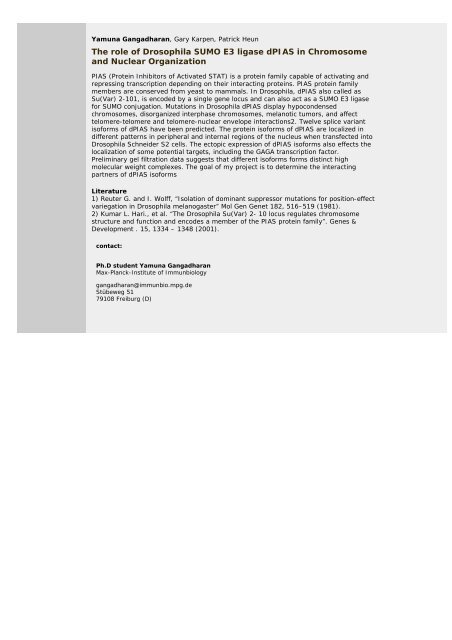Abstracts (poster) - Wissenschaft Online
Abstracts (poster) - Wissenschaft Online
Abstracts (poster) - Wissenschaft Online
You also want an ePaper? Increase the reach of your titles
YUMPU automatically turns print PDFs into web optimized ePapers that Google loves.
Yamuna Gangadharan, Gary Karpen, Patrick Heun<br />
The role of Drosophila SUMO E3 ligase dPIAS in Chromosome<br />
and Nuclear Organization<br />
PIAS (Protein Inhibitors of Activated STAT) is a protein family capable of activating and<br />
repressing transcription depending on their interacting proteins. PIAS protein family<br />
members are conserved from yeast to mammals. In Drosophila, dPIAS also called as<br />
Su(Var) 2-101, is encoded by a single gene locus and can also act as a SUMO E3 ligase<br />
for SUMO conjugation. Mutations in Drosophila dPIAS display hypocondensed<br />
chromosomes, disorganized interphase chromosomes, melanotic tumors, and affect<br />
telomere-telomere and telomere-nuclear envelope interactions2. Twelve splice variant<br />
isoforms of dPIAS have been predicted. The protein isoforms of dPIAS are localized in<br />
different patterns in peripheral and internal regions of the nucleus when transfected into<br />
Drosophila Schneider S2 cells. The ectopic expression of dPIAS isoforms also effects the<br />
localization of some potential targets, including the GAGA transcription factor.<br />
Preliminary gel filtration data suggests that different isoforms forms distinct high<br />
molecular weight complexes. The goal of my project is to determine the interacting<br />
partners of dPIAS isoforms<br />
Literature<br />
1) Reuter G. and I. Wolff, “Isolation of dominant suppressor mutations for position-effect<br />
variegation in Drosophila melanogaster” Mol Gen Genet 182, 516–519 (1981).<br />
2) Kumar L. Hari., et al. “The Drosophila Su(Var) 2- 10 locus regulates chromosome<br />
structure and function and encodes a member of the PIAS protein family”. Genes &<br />
Development . 15, 1334 – 1348 (2001).<br />
contact:<br />
Ph.D student Yamuna Gangadharan<br />
Max-Planck-Institute of Immunbiology<br />
gangadharan@immunbio.mpg.de<br />
Stübeweg 51<br />
79108 Freiburg (D)

















